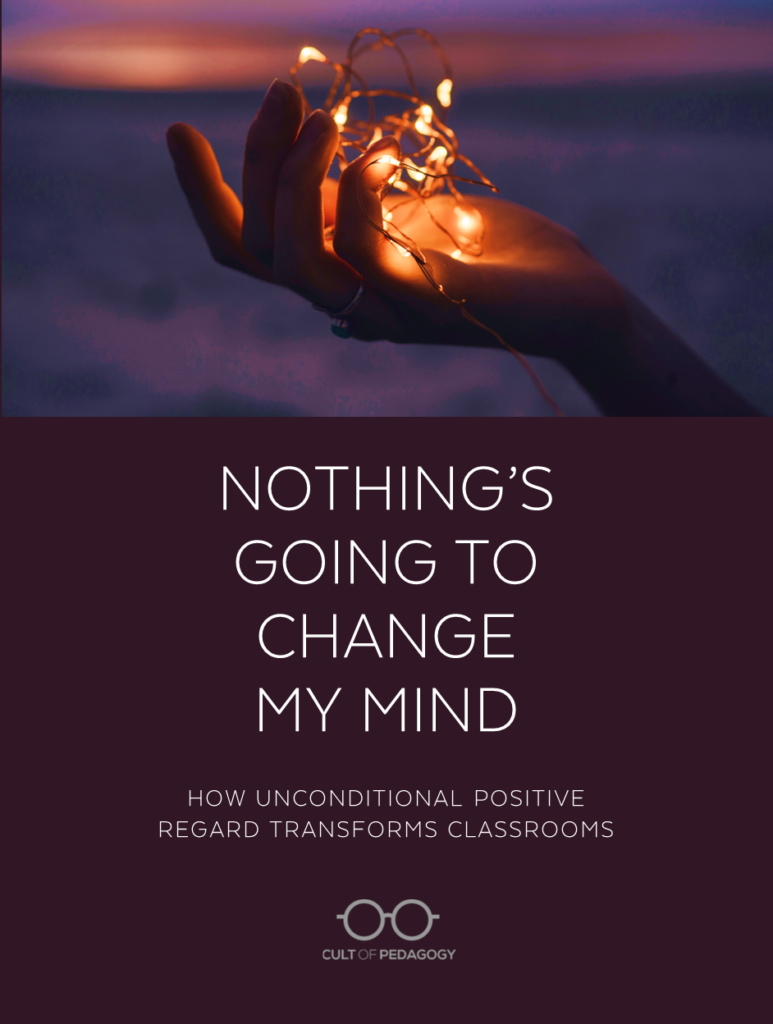
Listen to the interview with Alex Shevrin Venet (transcript):
Sponsored by EVERFI and Listenwise
This page contains Amazon Affiliate and Bookshop.org links. When you make a purchase through these links, Cult of Pedagogy gets a small percentage of the sale at no extra cost to you. What’s the difference between Amazon and Bookshop.org?
Among the many challenges teachers have faced since the onset of the pandemic, one that persists is this feeling that students have changed, that they are less motivated, more entitled, and more disrespectful than ever before. Even if a teacher can find plenty of evidence to support this perception, it can’t be making things any better.
And while it does seem that the pandemic exacerbated this feeling among teachers, I saw it long before we ever heard the word Covid. In the late 90s and early 2000s, I worked with far too many teachers who held a pretty low opinion of many of our students. There was a lot of “These kids (insert negative generalization)” or “Well what do you expect from him, he (insert negative generalization).”
I think many of these attitudes come from a real, valid, and vulnerable place, from teachers who once had high hopes but felt disappointed and hurt when things went wrong, teachers who had good intentions and got their hearts broken a little bit every time students rejected their efforts, teachers who see behaviors from their students that shock and frighten them. But regardless of where they come from, these mindsets hurt our relationships with students, and that makes everything else worse, from behavior to academics to the culture of school as a whole.
So with all of this in mind, I was intrigued when I came across the phrase unconditional positive regard. It was in Alex Venet’s book, Equity-Centered Trauma-Informed Education (Amazon | Bookshop.org), where she names it as the most important guiding philosophy in her work. Venet explains that unconditional positive regard is a stance that communicates this message to students: “I care about you. You have value. You don’t have to do anything to prove it to me, and nothing’s going to change my mind.” In her book, she asserts that taking this stance and putting it into practice builds the foundation on which our students can thrive. And the more I learned about it, the more I was sold on its value.
But I suspect that for most teachers, adopting this philosophy won’t be an easy task, because the demands of the job are so intense and the challenging behaviors students bring to school are so overwhelming. For some, even the idea of this philosophy might be off-putting at first, because you might see it as just another version of teacher-blaming. But it’s not. Unconditional positive regard doesn’t take accountability away from students for their behavior; it just works on the lens teachers use to address it, and that lens can make a huge difference, not only in how you interact with students, but how you feel about the work you do every day.
Because I think unconditional positive regard is such an important, revolutionary philosophy, and because implementing it can be challenging, I wanted to lift it out of the book and give it special attention. I already did an interview with Venet about the larger concept of trauma-informed teaching, but she agreed to have a separate conversation just on unconditional positive regard. You can listen to our conversation in the player above, read the full transcript, or get a peek at some of the key points of our conversation below.
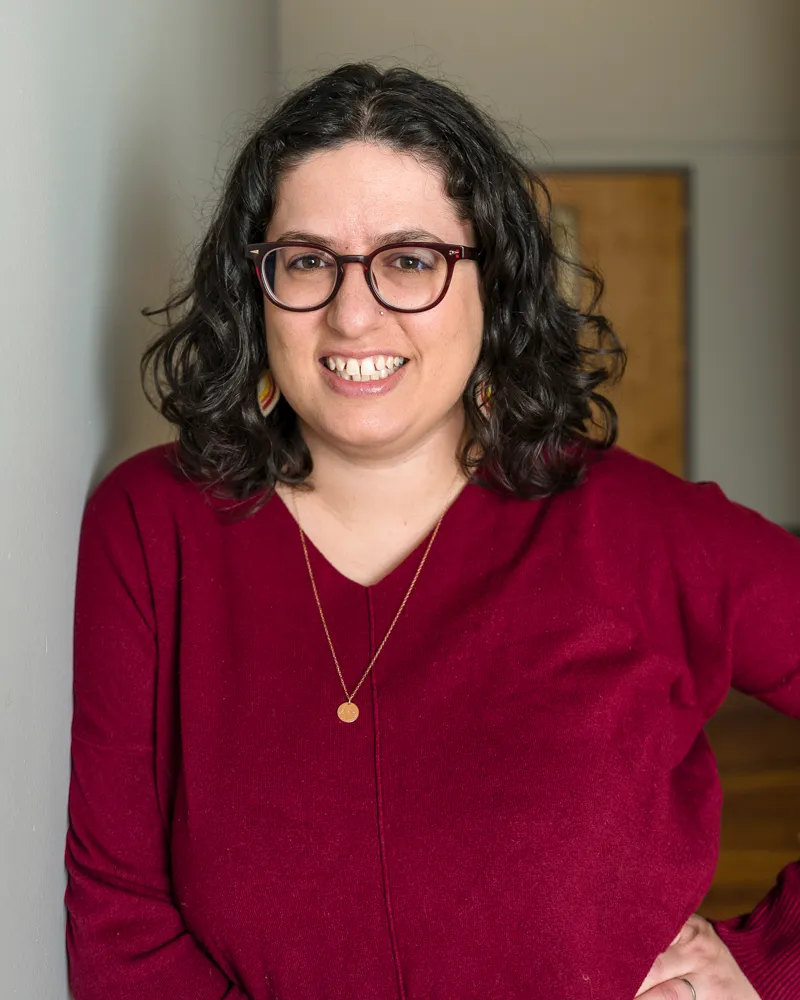
What is unconditional positive regard, and why is it such an important part of trauma-informed teaching?
“Unconditional positive regard means I care about you, you have value, you don’t have to do anything to prove it to me, and nothing will change my mind,” Venet says. “So it’s really this idea of seeing somebody as a whole and complete and worthy person starting from a place where care doesn’t have to be earned, it’s just assumed. Everybody gets care. You’re allowed to mess up. You’re allowed to have struggles, but that is never going to invalidate your worth, and it’s never going to invalidate my care for you.”
The concept was introduced to psychotherapy by Carl Rogers in the 1960s and applied to education by Alfie Kohn in a 2005 essay called Unconditional Teaching. Venet sees this stance as foundational in her work in equity-centered trauma-informed teaching “because it starts from that place of students are worthy, valuable people.”
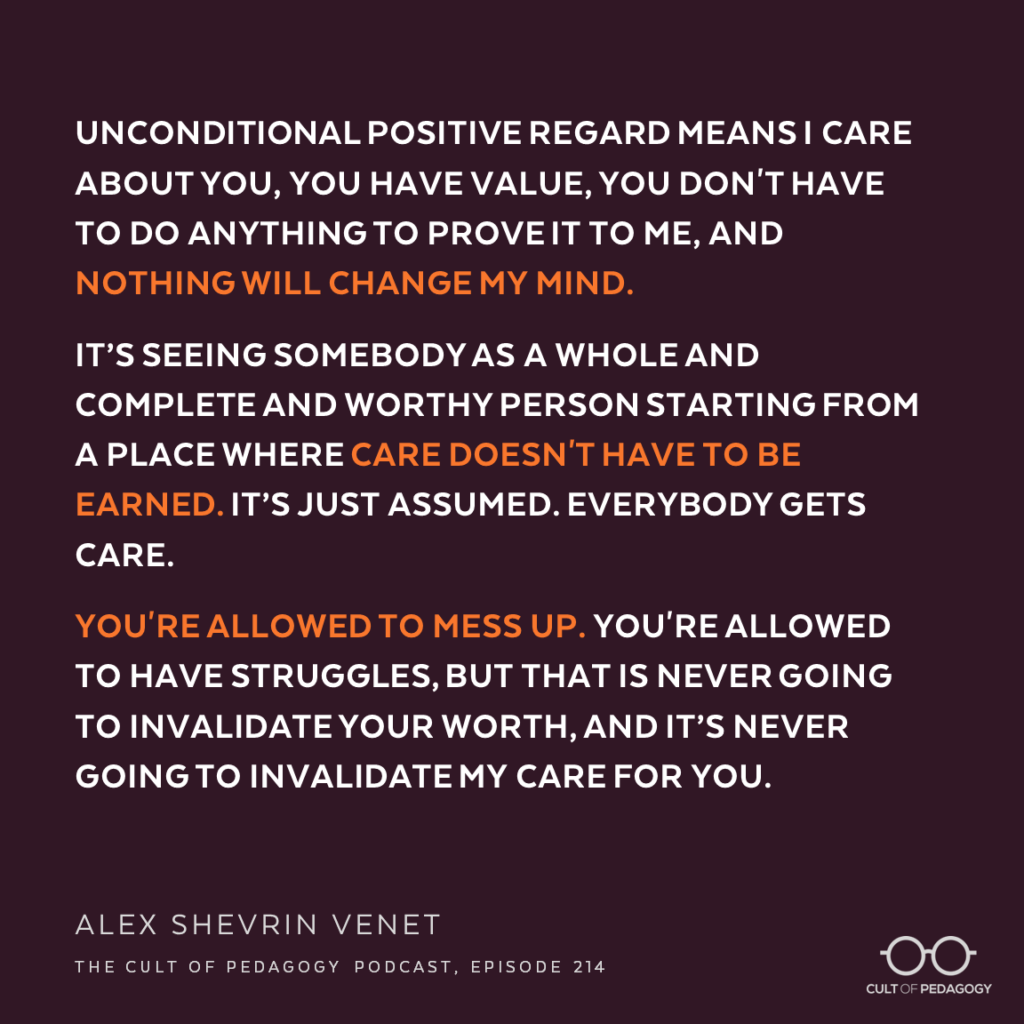
What does unconditional positive regard look like in practice?
“One of the things that allows for unconditional positive regard is to just get to know students,” Venet explains. “I mean it’s pretty basic but to get to know what they care about that’s not necessarily related to the content. If you only are looking at a kid and going, oh, you’re good at writing, you’re good at science, whatever, then your regard is going to be conditional because you’ve placed parameters around what types of strengths I’m going to see in you.”
It’s especially important to make this a priority for students with whom you don’t have much in common. “If I meet a student who is really into cats and the same TV shows as me and we have a similar sense of humor, it’s easy for me to like them, to care about them,” Venet says. But with students who only wanted to talk about Roblox, for example, “It was a little hard for me to find okay, where’s my connection point? If I reground myself in, okay, if I’m going to believe this student has value, I care about them, I need to just get inside a little bit. What makes them tick? So tell me about Roblox. What do you like about it? How do you feel when you’re playing it? Who do you get to connect with when you play Roblox? Where did you first learn about it?” Taking deliberate steps to get to know students as they are, outside of the context of your classroom, can help you see them as whole people.
Along with getting to know students, teachers practicing unconditional positive regard also work to learn about factors in students’ lives that make them behave in ways that bother the teacher.
“If a student seems to never pay attention when I’m talking,” she explains, “I’m not going to go immediately to a place of, Well, they’re not paying attention because they don’t care. Instead, I’m going to get curious and go, maybe something’s going on that’s distracting. Maybe they just have a hard time paying attention. Maybe I’m being kind of boring.” This stance of curiosity — both for getting to know the student and figuring out what things might be causing problems — is essential for building unconditional positive regard.
What about when students become especially difficult? What insights can you offer to teachers for those times?
Venet shares the story of a former student, “Julia,” who refused to participate, kept her head down most of the time, and hurled verbal insults at Venet when she tried to connect with her. Had she not been supported by her colleagues to take a stance of unconditional positive regard, “I could have come up with some conclusions like she’s disrespectful, she hates me, she hates school, she doesn’t care about her education. But by holding this unconditional positive regard, which essentially says with no evidence, I’m still going to believe that she has value and I’m still going to care about her, with no evidence that would support that, I gave it time.”
During this time, Venet made much more subtle bids for connection. “She wouldn’t talk to me in class, but if I was standing next to her in the lunch line, then I could make a little comment to her, and she would sometimes respond to it. I started to talk to her other teachers and try to find out a little bit. Like, what does she like? What makes her tick? She was really good at drawing, and so I started to see her art. I started to find some connection points. So then the next time she comes in, in the half a second before she puts her headphones in, I could say, hey, I saw you drawing in your last class. Can I see what you drew? And maybe she leaves one earbud out to start to talk to me about it.”
As this process unfolded, Venet began to understand that Julia’s behavior came from past trauma. “She has been really harmed by people in her life before and she’s protecting herself. She’s protecting herself because the same way that I don’t have evidence for her, she has no evidence for me. She doesn’t know that I’m safe. She doesn’t know that I think she can learn. She doesn’t know any of that. Out of the two of us, one of us had to take a leap of faith, and she’s the kid so it has to be me. I’m the teacher so it has to be me to do that. And so I stuck with it for her until we gained that trust and until we were able to build it up.”
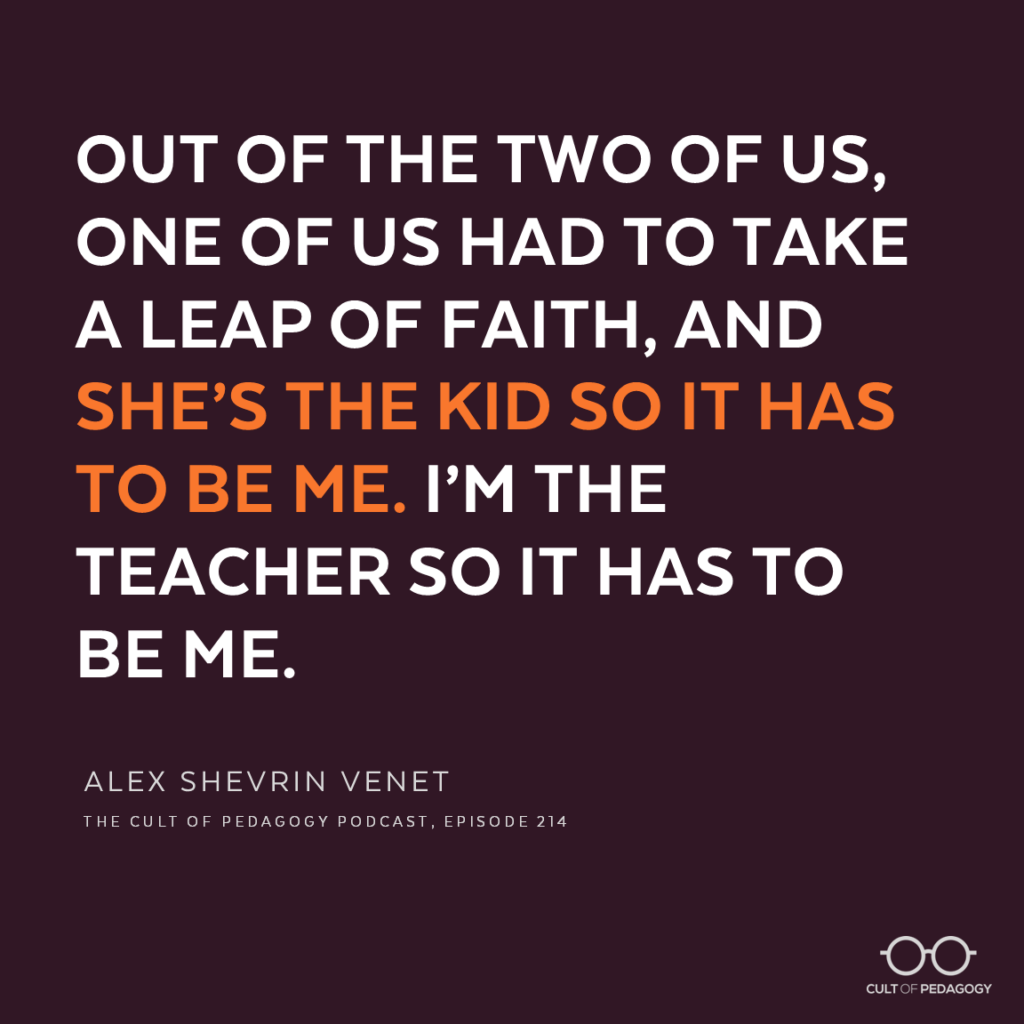
One quote that Venet keeps in mind in these difficult times comes from the book Trauma-Responsive Schooling (Amazon | Bookshop.org). “There’s a coach in that book who is coaching some of her peers, and this question that she asks of other teachers is, How would you respond differently if you knew the student’s behavior wasn’t a choice? If I look at Julia and I say, her behavior’s a choice. She is choosing to be mean to me and be disrespectful. Then maybe the action that I’m going to take is to say well, I’m going to punish her for it. I’m going to withdraw my part of the relationship. I’m going to put up a wall if she’s putting up a wall.”
Unconditional positive regard takes things in a different direction. “If I look at her and I say, maybe this isn’t a choice, but it is a protective reaction to try to not get hurt by another adult, then I’m going to respond how I did, which is I’m going to stick with it. I’m going to try to earn her trust while always holding this idea that I think we’re going to get there one day.”
Even if the behavior IS a choice, Venet says, taking this stance helps the teacher approach the situation in a healthier way.
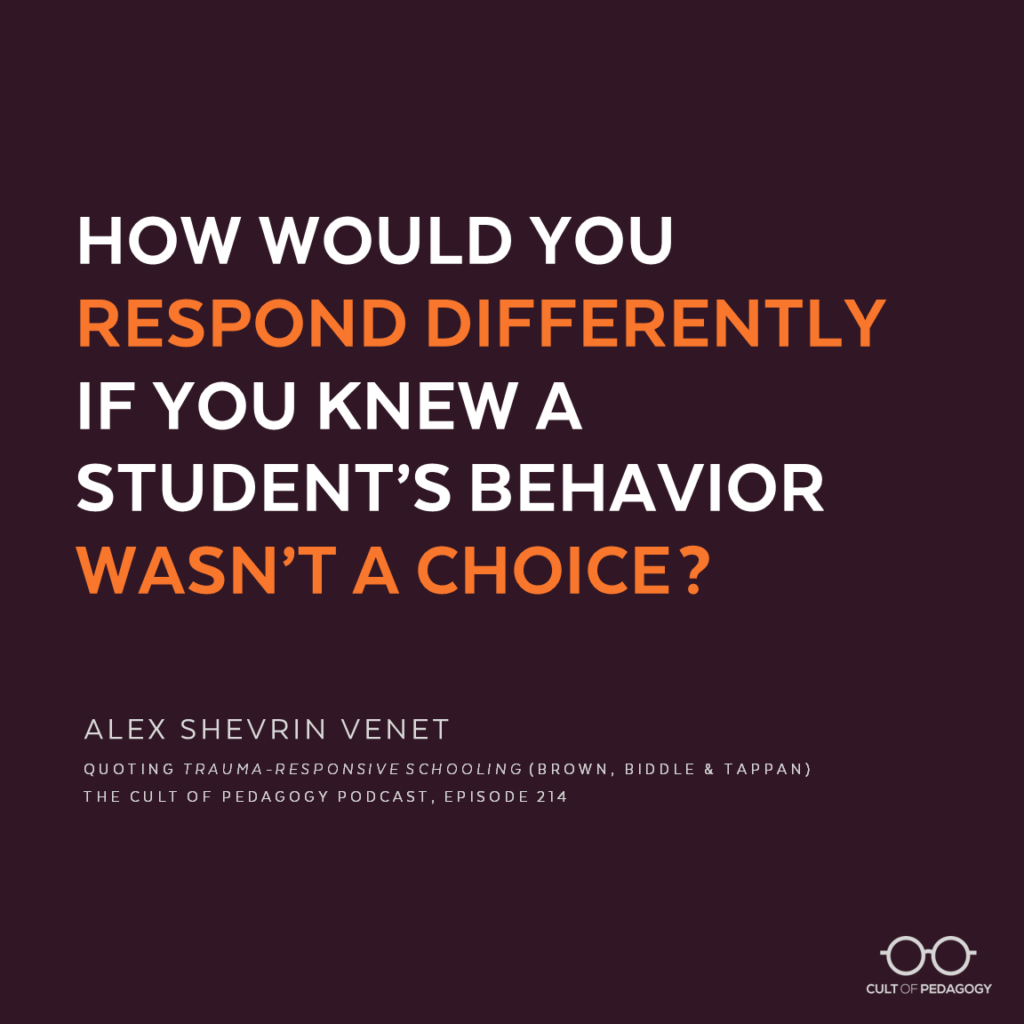
You advise teachers to have regular “perspective-keeping” conversations with colleagues to help stay on track with unconditional positive regard. Why are these important and how do they help?
“The relationship between a student and a teacher is not equal,” Venet begins. “If I was going to meet up with a friend, and my friend called me a really horrible word and put her headphones in, I could just go, well, I’m not going to tolerate that from my friend. I don’t have to spend time with this person. That’s not the same relationship we have with students; students are required to be there and you’re required to teach them. But as the adult, we have more power. We have the ability to impose consequences that can have long-lasting impacts.
“And so if a student hurts my feelings, it’s okay for my feelings to be hurt. It’s okay for me to say, that felt really bad. I hated that. I don’t want to tolerate that behavior from people around me. However, the student can never be responsible for making me feel better or be responsible for my emotions because the power differential is not equal. I can’t make that student responsible for me because they’re not. They’re required to be in school. I’m required to teach them.”
But teachers shouldn’t feel like they are trapped with their feelings; they can get help from their colleagues. “I can go to my colleagues and talk about how I was hurt, and they can say, yeah, that sounds really hard. We can process it. And then they can help me reset and say, okay, how are you going to show up tomorrow given the fact that you’re feeling really hurt? How can you continue to hold this regard for her even though she is harming you?”
And if the student really crosses a line? “For example, if the student was calling me a slur based on my identity,” Venet offers, “then I need to have people around me who can say, yeah, you shouldn’t go back in that room with her tomorrow but she still deserves a teacher, so we’re going to tag out. Somebody else is going to work with her. We’re going to work on educating her. We’re going to solve this problem. It requires a team effort. And I think this is where people have a hard time when we talk about unconditional positive regard, because if you are the only person in your building who’s trying to make this shift, it’s really going to be difficult because our schools are not set up to foster this.”
“If we commit to an ethic of care, building relationships and caring for our students aren’t strategies in the name of increasing academic achievement but the actual goal itself.” This is from page 100 of your book. Embracing this stance would be a huge paradigm shift for many U.S. educators. Why do you think it’s worth considering?
“It’s basically the opposite of what we do in schools right now,” Venet says, “and schools right now are so toxic in a lot of ways. What would it look like if kids just felt safe and cared about as part of their school experience? There’s all this competition in schools, whether it be sports or perfect attendance awards or grades and scholarships or whatever, and people justify this by saying, well that’s society and what do you want? That every kid gets a trophy? Well, what I want to ask is, have you ever been in an environment where every kid actually did get a trophy and seen how beautiful it was?
“At the school where I taught, they used to do this end of the year ceremony that was for kids who were graduating but also every kid in the whole school, and it was a small school so this was doable. And we actually gave a personalized academic award to every single student. All the teachers who shared students would fill out these little sheets of paper and kind of reflect on what was some of the academic growth that you saw this year. And we would create an award for every single kid, and then at this ceremony give them out. And it was absolutely beautiful. The kids really didn’t care that everybody else was getting an award because what their personal award said to them was my teachers saw and noticed this thing I worked really hard on. So every kid getting a trophy? I don’t know. I think that’s great.
“I think a big part of why our world is so traumatic right now is a feeling of scarcity and competition, that there’s only limited resources, and we all have to claw at each other to get the resources, and if you’re in the way of that then you’re my enemy. What if, instead of replicating that in school by saying there’s only three sports awards, there’s only one senior award, what if we work from abundance and said there’s enough for everyone? There’s enough care for everyone. There’s enough celebration for everyone. And actually celebrating you doesn’t mean that I lose. It means that we all have won collectively. When we make small choices as teachers to work from a place of unconditional care, we’re planting the seeds for those bigger changes.”
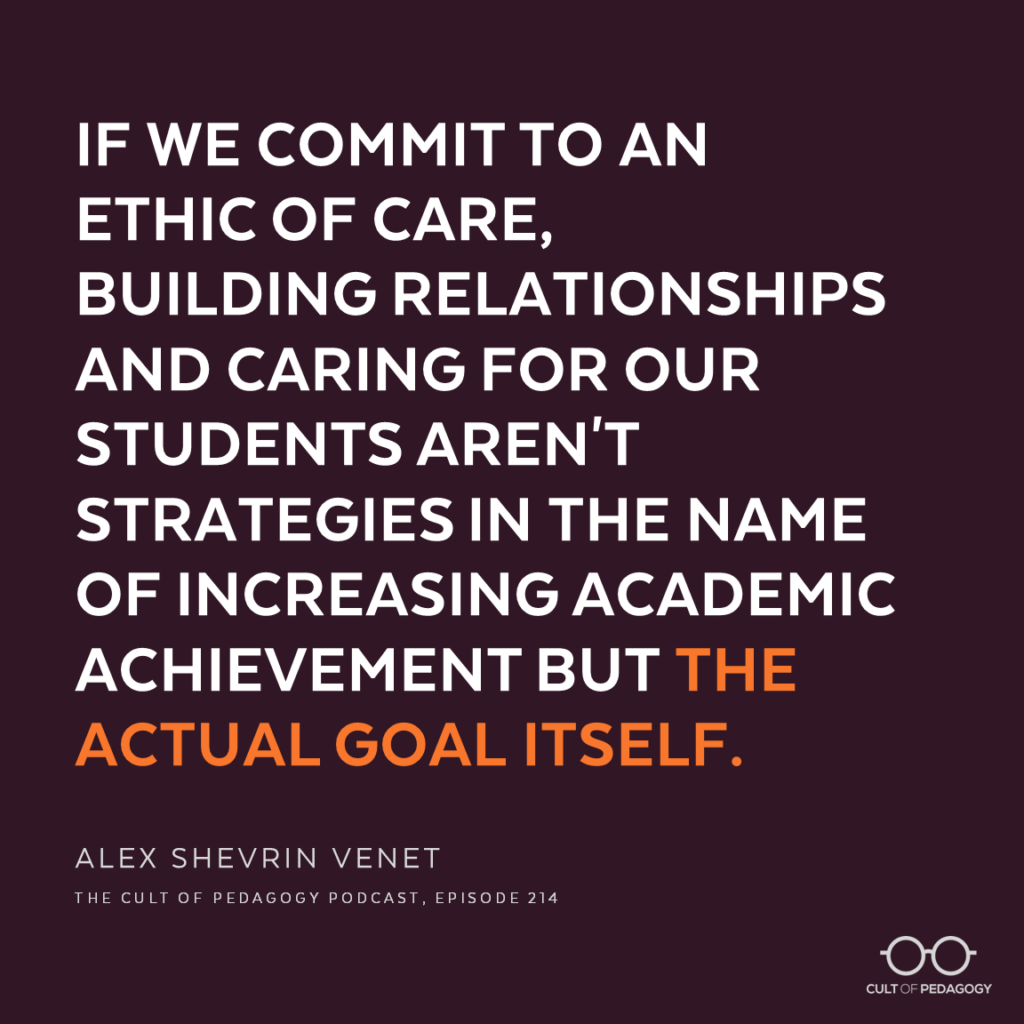
You can find Alex Shevrin Venet’s work at unconditionallearning.org.
Join our mailing list and get weekly tips, tools, and inspiration that will make your teaching more effective and fun. You’ll get access to our members-only library of free downloads, including 20 Ways to Cut Your Grading Time in Half, the e-booklet that has helped thousands of teachers save time on grading. Over 50,000 teachers have already joined—come on in.

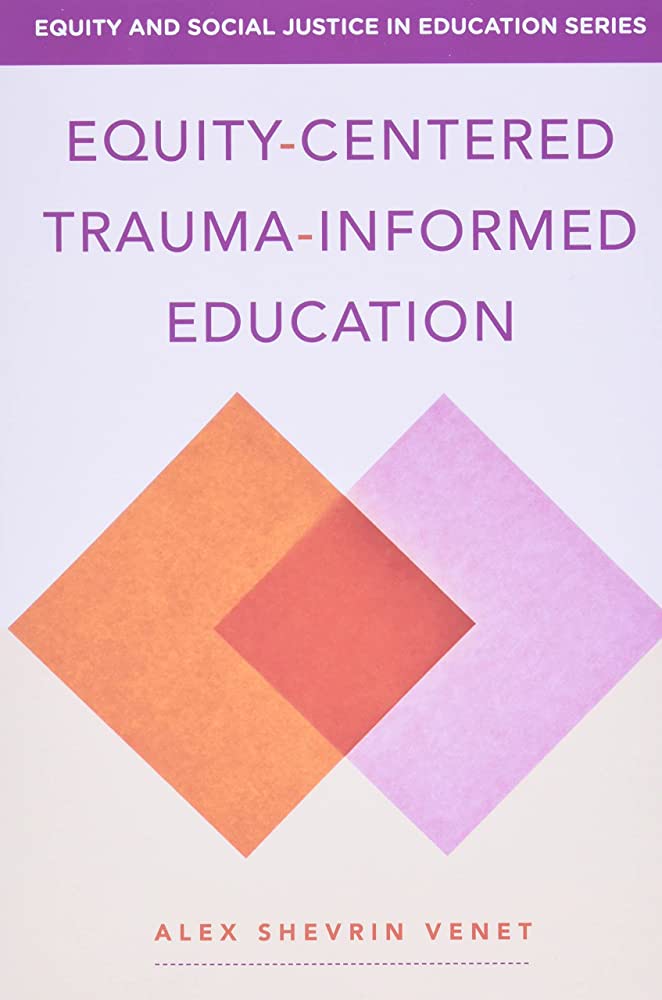




I love this post and interview! I’m an academic support counselor, and my colleague and I talk about this skill/quality/mindset in teachers all the time. I’ve never had a great way to define it until now – unconditional positive regard. I always think of it as a “Ted Lasso Effect” after the popular TV show! It’s also very impactful to use with kids who have learning differences/disabilities. Having school be very difficult for you – being in flight or fight mode – for 15 years is a very slow form of trauma for some kids. You see them go into the classrooms of teachers who practice unconditional positive regard and just exhale. They know they are safe there to actually try, and they will be both protected and supported… and eventually feel like they belong. As a result, they tend to engage more and make progress in those subject areas; even when they’re inherently difficult. The relationship they have with the teacher creates a layer of motivation for learning. Thank you, Alex!
Thanks for sharing that insight, Sarah! We’re so glad that you found the interview meaningful.
Positive unconditional regard for students = 100%. I believe that the same practice – unconditional positive regard for teachers from admin would also transform schools. We need to walk the talk of a partnership in order to truly have equity-centered trauma-informed education.
Ann, I wholeheartedly agree that unconditional positive regard at all levels would transform our schools for the better. A culture in which, as Alex says, “everyone gets care” would make such a tremendous difference.
I hope there are administrators out there who are already practicing unconditional positive regard for all staff, including teachers. I also hope there are administrators who will commit to making this shift in their practice as a result of reading this post!
Throughout the nineties I taught in an at-risk alternative high school and this concept was our guiding principle–I just never knew it had a name!
For the next 13 years of my career in a regular middle school I was always aghast at how little regard so many teachers actually have for students. It can be very hard to avoid catching that viral attitude, so many times I returned to visit with my former colleagues to regain my focus.
Thank you so much, Jennifer and Alex, for emphasizing the importance of valuing each student simply because they are a live human being. And for being the support so many of us need right now when we are inundated with negativity.
Thank you for sharing your experiences, Barbara! We’re so glad that educators like you and your colleagues were putting this into practice even before you had a name for it!
Thank you for reminding all of us the importance of accepting the whole child, no matter what. My guru, Dave Stuart Jr., posted an article once and called it “Practicing Radical Acceptance”. I have it on a post-it on the front of my computer! I am thinking now that it deserves to be posted in the front of my room and discussed with students, so that they, too, can practice it. Wouldn’t it be refreshing if spreading this idea around starts a trend? One can only hope.
Thanks for sharing, Tracy! I’ll definitely join you in hoping that this idea spreads widely.
I really enjoyed this post. I hadn’t heard the phrase unconditional positive regard, and it’s perfect. I felt a strong connection to the suggestion of having curiosity. Whenever I encounter a situation where a student is misbehaving, I ask myself questions:
What need is not being met? Have I given them a text that is not accessible to them? Have I given a task they don’t understand? Am I threatening to disrupt their social status by what I’m asking them to do?
By remaining curious, and trying my best to accept their behaviour for the mystery it is and being determined to figure that student out… I have a much better time in the classroom. It might take longer than I’d hoped to figure out what makes someone tick, but it’s SO worth it.
I whole heartedly believe in this approach. Finding the “Why” in behaviors is Key. I also know how difficult it can be on a daily basis with certain students.
My Question:
How do you set up consequences for complete disregard of classroom rules and staff-splitting?
Hi there, this is Alex from this episode 🙂 For me, I would start with questioning my assumption about “complete disregard for classroom rules” and try to understand what’s really going on for the student. Is it truly that they simply don’t want to follow rules, or is something feeling challenging for them at school (or at home), or are some of my rules not worthy following, etc. I like the structure of collaborative problem solving (look up the book The School Discipline Fix) to get to the root of the issue. Re: staff splitting, that’s a pretty easy one to fix if teachers/staff communicate and get on the same page. Slowing down is important so we can check in with one another!
I really enjoyed reading this interview! It reminded me about an article I read about the difference between caring about students and caring for students. At times you need both, but often the tendency when you only care about students is that you only care about the students who care about school. In contrast, when you care for students you care about them as people, unconditional of how much they care about school. I’m curious, have there been any examples of schools/districts enacting this philosophy on a larger scale?
Hi Greta, this is Alex from this episode 🙂 I worked in a school that was designed with unconditional positive regard, but unfortunately that school is no longer open. I work with many educators who are implementing these ideas in their schools and districts, but there’s not one that I can specifically point to that has made unconditional positive regard a priority in their whole-school practice. I would love to hear if others have some in mind though!